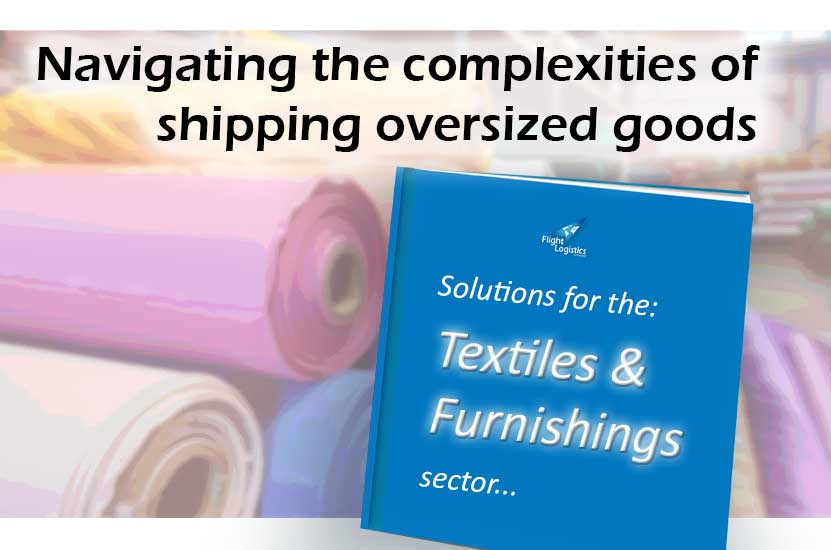Shipping oversized goods, such as large rolls of fabric or bulky furniture, presents unique challenges for textile and furnishing businesses. Complications arise from regulations, duty calculations, and the high costs associated with transporting large “out-of-gauge” items. However, these obstacles can be mitigated with strategic planning and expert advice.
This article explores the intricacies of shipping oversized goods globally and offers solutions for businesses in the textile and furnishing industry.
THE CHALLENGES
Shipping oversized goods globally involves navigating a complex logistical landscape. The global express industry spends millions equipping their operations for small, standardised cardboard boxes that are easy to handle, stack, transport, and fit seamlessly into logistics networks designed for efficiency and speed. However, the textiles and furnishings sector often deals with out-of-gauge or non-compatible shipments such as long rolls of fabric, which face significant pricing challenges.
The Main challenges with out-of-gauge and non-compatible shipments
- Size and shape surcharges: Parcels that exceed certain dimensions – typically a combined length, width, and height greater than 270 cm – are subject to hefty surcharges. These out-of-gauge shipments do not fit the standard handling processes and require manual handling, increasing operational costs for logistics companies and their clients.
- Long length surcharges: Shipments exceeding 1 meter or 1.2 meters in length (depending on the carrier) also incur additional charges. These long items disrupt the packing efficiency of transport vehicles and often require special handling or placement, further driving up costs.
- Packaging constraints: Unlike many sectors that use cardboard packaging, the textiles and furnishings industry often relies on tough waterproof plastic wrappings for large rolls of fabric. Cardboard packaging, while ideal for standard shipments, is impractically expensive and no more protective for these oversized items. However, using plastic adds another layer of cost due to surcharges imposed by carriers for non-standard packaging.
Global shipping regulations and duties
Shipping oversized textile and furnishing items internationally involves complex duty calculations, especially for items composed of multiple fabrics. Each material must be identified, assigned an HS code, and declared on the commercial invoice. This process can be expensive as carriers will add charges if there are more than three HS codes in an entire shipment. It can also be a time-consuming customs entry process, resulting in delays.
Regulations impose duties and import VAT on goods entering different countries. Determining who bears these costs can be problematic. Customers are often reluctant to pay these additional charges, leaving the sender to cover them. If the exporter has to carry the additional financial burden of paying for the duty and VAT, it is a pure cost to the exporter as the VAT is non-reclaimable under those circumstances. These financial burdens necessitate a more cost-effective approach to shipping oversized items.
THE SOLUTION
Flight Logistics: An expert in oversized shipments
Flight Logistics, with over 30 years of distribution experience, specialises in the textiles and furnishings sector. Our expertise ranges from assisting interior designers to multinational textile and furnishing companies. Flight Logistics offers reliable advice and solutions tailored to the complexities of shipping oversized goods.
Strategies to mitigate shipping costs
Flight Logistics recognises these challenges and actively seeks ways to mitigate the impact of surcharges on our clients in the textiles and furnishings sector. Our strategies include:
- Negotiated rates and contracts: Leveraging our extensive network and long-standing relationships with carriers, Flight Logistics negotiates favourable rates and terms for our clients that they otherwise would not have access to. These negotiated agreements include reduced surcharges or exemptions for certain types of out-of-gauge shipments.
- Carrier selection: By evaluating the specific requirements of each oversized shipment – destination, value, and dimensions – Flight Logistics can select the most cost-effective carrier, avoiding excessive surcharges whenever possible.
- Customs expertise: Providing comprehensive support in duty calculations and HS code assignments to ensure compliance and avoid unnecessary delays.
By implementing these strategies, Flight Logistics helps businesses in the textile and furnishing sector reduce shipping costs and streamline the process of sending oversized goods globally.
Fiscal representation
By establishing a local fiscal representative in the region to perform the functions of the Importer of Records, VAT can be paid and subsequently reclaimed, reducing the overall cost of shipping. This strategic approach helps businesses navigate the financial challenges posed by international regulations.
Conclusion
By addressing these specific challenges head-on, Flight Logistics ensures that businesses in the textiles and furnishings sector can continue to ship their products efficiently and cost-effectively worldwide. Our commitment to finding innovative solutions helps mitigate the financial burdens associated with oversized and non-compatible shipments, enabling our clients to remain competitive in the global market.
Flight’s Services include: Ecommerce Fulfilment, Storage & Logistics, Courier Services, Fragile and Art handling (ShipArtTM), Mail & Fulfilment, Marketing Support, and Freight Services.














